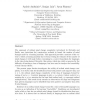Free Online Productivity Tools
i2Speak
i2Symbol
i2OCR
iTex2Img
iWeb2Print
iWeb2Shot
i2Type
iPdf2Split
iPdf2Merge
i2Bopomofo
i2Arabic
i2Style
i2Image
i2PDF
iLatex2Rtf
Sci2ools
EUROCOLT
1997
Springer
1997
Springer
Ordinal Mind Change Complexity of Language Identification
The approach of ordinal mind change complexity, introduced by Freivalds and Smith, uses (notations for) constructive ordinals to bound the number of mind changes made by a learning machine. This approach provides a measure of the extent to which a learning machine has to keep revising its estimate of the number of mind changes it will make before converging to a correct hypothesis for languages in the class being learned. Recently, this notion, which also yields a measure for the difficulty of learning a class of languages, has been used to analyze the learnability of rich concept classes. The present paper further investigates the utility of ordinal mind change complexity. It is shown that for identification from both positive and negative data and n 1, the ordinal mind change complexity of the class of languages formed by unions of up to n + 1 pattern languages is only
Related Content
| Added | 25 Aug 2010 |
| Updated | 25 Aug 2010 |
| Type | Conference |
| Year | 1997 |
| Where | EUROCOLT |
| Authors | Andris Ambainis, Sanjay Jain, Arun Sharma |
Comments (0)

